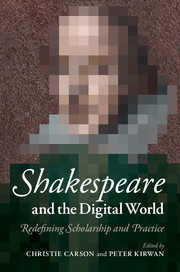Book contents
- Frontmatter
- Contents
- Notes on contributors
- Acknowledgements
- Shakespeare and the digital world
- Part I Defining current digital scholarship and practice
- Part II Defining current digital scholarship and practice
- Half-time: A pause for reflection
- Part III Redefining the boundaries and practices of Shakespeare studies online
- Part IV Redefining the boundaries and practices of Shakespeare studies online
- Index
Part III - Redefining the boundaries and practices of Shakespeare studies online
Publishing and academic identity
Published online by Cambridge University Press: 05 July 2014
- Frontmatter
- Contents
- Notes on contributors
- Acknowledgements
- Shakespeare and the digital world
- Part I Defining current digital scholarship and practice
- Part II Defining current digital scholarship and practice
- Half-time: A pause for reflection
- Part III Redefining the boundaries and practices of Shakespeare studies online
- Part IV Redefining the boundaries and practices of Shakespeare studies online
- Index
Summary
Identity politics in the digital age can be confusing. My departmental profile announces me as ‘Dr. Peter Kirwan’, while my email signature usually identifies me as ‘Peter’. To many of my colleagues I am ‘Pete’, while for those students who prefer a degree of formality I am ‘Dr. Kirwan’. On Twitter I am @drpetekirwan, and in online discourse I am often referred to by the title of my performance review blog, The Bardathon. Each of these identities is performed differently, assuming a unique series of relationships, hierarchies, content specialisms, presentational conventions and technical limitations. I am large, I contain multitudes.
Janet Wright Starner and Barbara Howard Traister’s introduction to their study of cultures of anonymity in early modern England begins by noting that:
The proliferation of anonymously published texts may be most noticeable in electronic spaces, where texts can circulate without attribution because the content is noteworthy . . . readers coming to this sort of work rarely think about the absence of an author’s signature because by custom and tradition they do not expect one to appear in the first place. (2011: 1–2)
In my earlier chapter, I discussed the ways in which the Gutenberg Parenthesis provides a model for understanding the relationship between the often-anonymous textual discourse that preceded the printing press and the often-anonymous textual discourse that can be found throughout the internet. What Starner and Traister’s comparison does not make explicit, however, is that the lack of a ‘real’ name in internet discourse does not equate to an absence of signature. The politicisation of even the word ‘Anonymous’ both by Roland Emmerich’s 2011 movie and the digital ‘hacktivist’ group that share the name ensures that anonymity, in the digital age, is far from neutral or invisible. Handles, tags, usernames and institutional identities all feature strongly in the exchange of digital information as Shakespeareans from all backgrounds form electronic identities in web publishing.
- Type
- Chapter
- Information
- Shakespeare and the Digital WorldRedefining Scholarship and Practice, pp. 127 - 131Publisher: Cambridge University PressPrint publication year: 2014



